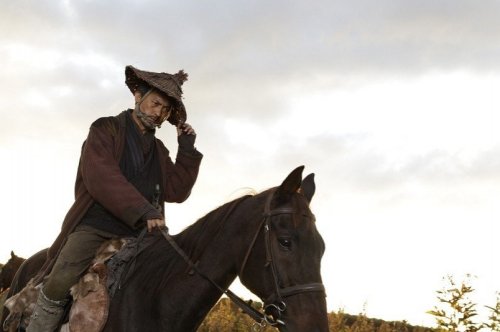Reviews - Unforgiven
Unforgiven
Reviewed By John Porter

Unforgiven
For the final movie of the season, Lee Sang-il re-stages Clint Eastwood's 1992 Western 'Unforgiven' in a late 19th century Far East. Instead of the plains of the American West we have a Japan in transition as the Shogun falls, leaving the final scattering of samurai to flee into the northern wilderness of Hokkiado. Jubei (Ken Watanabe) is one of these warriors in hiding. After evading the law enforcement that would herald a new political system in the country, he now lives on a windswept stretch of coast with his two young children and attempts to make a living off the land. When an offer comes to partner up with old war buddy Kingo (Akira Emoto) and collect a bounty on two men accused of cutting the face of a prostitute in a distant town, he accepts, digs up his rusted sword, and the duo journey yet further north.
There is a long cinematic history of 'back and forth-ing' between the Western genre and the Jidaigeki (period films) of Japanese cinema. Kurosawa drew inspiration for his 1954 epic 'Seven Samurai' from the earlier horse-operas of John Ford, before seeing his movie remade by John Sturges as 'The Magnificent Seven', while his 'Yojimbo' was re-envisioned by Sergio Leone as 'A Fistful of Dollars'. 'Yurusarezaru mono/Unforgiven' is the latest in this line. Remakes are slippery, fascinating beasts; if you are even remotely familiar with the original, the aspect of comparison is unavoidable and, when the pair are as similar as in this case, arguably necessary.
As the ageing killers ride towards their goal, the landscape of the island is portrayed as a thing of rugged beauty. The ice-capped peaks and burnished wastes below are captured as a very physical frontier by Norimichi Kasamatsu's elegant use of the widescreen, ensuring that we always believe in the distant lawlessness of the setting. This visual flair continues into many of the compositions and colours, with the contrasting of red roaring fires and blood against the thick snow being beautifully realised interpretations on this familiar trope of swordplay movies. The Western translates well to Edo Japan on this surface level, and as a samurai picture 'Yurusarezaru mono' looks fantastic. With deeply lit, musky beiges of the brothel interiors, impossibly pink sunsets and silhouettes, and several battle sequences which deftly balance the western and eastern influences, the movie exudes the exoticism of the Orient whilst remaining exciting.
Joined by a cocky young vagabond named Goro (Yuya Yagira), the pair become a trio, and upon reaching their destination encounter the self-styled Chief of police (Koichi Sato). Compared with Gene Hackman's complex portrayal of the same character in Eastwood's original, the Chief comes across as little more than a sadist with an oversized moustache. Unfortunately many more of the figures, although striking admirable physical poses and wearing their grime and scars with pride, are also flat and superficial. Jubei is a much changed protagonist from Eastwood's William Munny: In flashbacks we see Jubei on the run and fighting for his life, not killing women and children for the sake of red-eye whiskey like Munny. Jubei is sanitised even more when we are told that he didn't really kill a group of Christians, an act that his 'bad' reputation rests on. Yet the narrative from the original remains the same. This is where the movie falls down. In making Jubei less nasty, he also becomes less tortured, and so many of the intricate themes of guilt and redemption which are attempted in the narrative are lost. Instead, we are left with the characters telling us over and over that, "the past is following...".
Ironically, 'Yurusarezaru mono' feels more like a product of Hollywood than the sublimity of Eastwood's 'Unforgiven', with a score that borders on the melodramatic and a trend of telling the audience what to think instead of showing and trusting to their intelligence. Where the movie does take liberties with the source material however, it seems to achieve a fresh lease of life. Tackling the persecution of the Ainu peoples, we witness a scene of a native village under the lash of the Chief's troops, before Jubei admits that he too took his Ainu wife by force. Goro also reveals that the root of his vagabondage was being born Ainu: "nothing but a worm".
There is no doubt that ‘Yurusarezaru mono' is a brave movie to remake it’s source so closely (some sequences being virtually shot for shot) and is also a pretty one, but it never quite lives up to it’s potential. I entered the cinema with an excitement for unknown possibilities of what might have been done with Eastwood’s ‘Unforgiven’, yet left with the impression that I had seen a well polished samurai film that was somehow slightly held back by treating it’s mould so rigidly.
There is a long cinematic history of 'back and forth-ing' between the Western genre and the Jidaigeki (period films) of Japanese cinema. Kurosawa drew inspiration for his 1954 epic 'Seven Samurai' from the earlier horse-operas of John Ford, before seeing his movie remade by John Sturges as 'The Magnificent Seven', while his 'Yojimbo' was re-envisioned by Sergio Leone as 'A Fistful of Dollars'. 'Yurusarezaru mono/Unforgiven' is the latest in this line. Remakes are slippery, fascinating beasts; if you are even remotely familiar with the original, the aspect of comparison is unavoidable and, when the pair are as similar as in this case, arguably necessary.
As the ageing killers ride towards their goal, the landscape of the island is portrayed as a thing of rugged beauty. The ice-capped peaks and burnished wastes below are captured as a very physical frontier by Norimichi Kasamatsu's elegant use of the widescreen, ensuring that we always believe in the distant lawlessness of the setting. This visual flair continues into many of the compositions and colours, with the contrasting of red roaring fires and blood against the thick snow being beautifully realised interpretations on this familiar trope of swordplay movies. The Western translates well to Edo Japan on this surface level, and as a samurai picture 'Yurusarezaru mono' looks fantastic. With deeply lit, musky beiges of the brothel interiors, impossibly pink sunsets and silhouettes, and several battle sequences which deftly balance the western and eastern influences, the movie exudes the exoticism of the Orient whilst remaining exciting.
Joined by a cocky young vagabond named Goro (Yuya Yagira), the pair become a trio, and upon reaching their destination encounter the self-styled Chief of police (Koichi Sato). Compared with Gene Hackman's complex portrayal of the same character in Eastwood's original, the Chief comes across as little more than a sadist with an oversized moustache. Unfortunately many more of the figures, although striking admirable physical poses and wearing their grime and scars with pride, are also flat and superficial. Jubei is a much changed protagonist from Eastwood's William Munny: In flashbacks we see Jubei on the run and fighting for his life, not killing women and children for the sake of red-eye whiskey like Munny. Jubei is sanitised even more when we are told that he didn't really kill a group of Christians, an act that his 'bad' reputation rests on. Yet the narrative from the original remains the same. This is where the movie falls down. In making Jubei less nasty, he also becomes less tortured, and so many of the intricate themes of guilt and redemption which are attempted in the narrative are lost. Instead, we are left with the characters telling us over and over that, "the past is following...".
Ironically, 'Yurusarezaru mono' feels more like a product of Hollywood than the sublimity of Eastwood's 'Unforgiven', with a score that borders on the melodramatic and a trend of telling the audience what to think instead of showing and trusting to their intelligence. Where the movie does take liberties with the source material however, it seems to achieve a fresh lease of life. Tackling the persecution of the Ainu peoples, we witness a scene of a native village under the lash of the Chief's troops, before Jubei admits that he too took his Ainu wife by force. Goro also reveals that the root of his vagabondage was being born Ainu: "nothing but a worm".
There is no doubt that ‘Yurusarezaru mono' is a brave movie to remake it’s source so closely (some sequences being virtually shot for shot) and is also a pretty one, but it never quite lives up to it’s potential. I entered the cinema with an excitement for unknown possibilities of what might have been done with Eastwood’s ‘Unforgiven’, yet left with the impression that I had seen a well polished samurai film that was somehow slightly held back by treating it’s mould so rigidly.
Find A Film
Search over 1500 films in the Keswick Film Club archive.
Friends
KFC is friends with Caldbeck Area Film Society and Brampton Film Club and members share benefits across all organisations
Awards
Keswick Film Club won the Best New Film Society at the British Federation Of Film Societies awards in 2000.
Since then, the club has won Film Society Of The Year and awards for Best Programme four times and Best Website twice.
We have also received numerous Distinctions and Commendations in categories including marketing, programming and website.
 Talking Pictures
The KFC Newsletter
Talking Pictures
The KFC Newsletter
Links Explore the internet with Keswick Film Club


